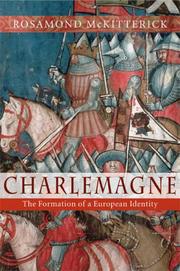| Listing 1 - 2 of 2 |
Sort by
|
Book
ISBN: 0801467780 0801467799 9780801467790 9780801451485 0801451485 1322504334 1501748513 9781501748516 Year: 2013 Publisher: Ithaca Cornell University Press
Abstract | Keywords | Export | Availability | Bookmark
 Loading...
Loading...Choose an application
- Reference Manager
- EndNote
- RefWorks (Direct export to RefWorks)
Charlemagne never traveled farther east than Italy, but by the mid-tenth century a story had begun to circulate about the friendly alliances that the emperor had forged while visiting Jerusalem and Constantinople. This story gained wide currency throughout the Middle Ages, appearing frequently in chronicles, histories, imperial decrees, and hagiographies-even in stained-glass windows and vernacular verse and prose. In Emperor of the World, Anne A. Latowsky traces the curious history of this myth, revealing how the memory of the Frankish Emperor was manipulated to shape the institutions of kingship and empire in the High Middle Ages.The legend incorporates apocalyptic themes such as the succession of world monarchies at the End of Days and the prophecy of the Last Roman Emperor. Charlemagne's apocryphal journey to the East increasingly resembled the eschatological final journey of the Last Emperor, who was expected to end his reign in Jerusalem after reuniting the Roman Empire prior to the Last Judgment. Instead of relinquishing his imperial dignity and handing the rule of a united Christendom over to God as predicted, this Charlemagne returns to the West to commence his reign. Latowsky finds that the writers who incorporated this legend did so to support, or in certain cases to criticize, the imperial pretentions of the regimes under which they wrote. New versions of the myth would resurface at times of transition and during periods marked by strong assertions of Roman-style imperial authority and conflict with the papacy, most notably during the reigns of Henry IV and Frederick Barbarossa. Latowsky removes Charlemagne's encounters with the East from their long-presumed Crusading context and shows how a story that began as a rhetorical commonplace of imperial praise evolved over the centuries as an expression of Christian Roman universalism.
East and West --- East and West in literature. --- Authority in literature. --- Literature, Medieval --- Civilization, Western --- Civilization, Oriental --- Occident and Orient --- Orient and Occident --- West and East --- Eastern question --- History --- History and criticism. --- Asian influences --- Oriental influences --- Western influences --- Charlemagne, --- Influence. --- Legends --- Holy Roman Empire --- Kings and rulers. --- Karol Wielki, --- Karl --- Carolus Magnus, --- Shārlmān, --- Charles the Great, --- Karl Velikiĭ, --- Carlo Magno, --- Carlos Magno, --- Karolus Magnus, --- Karl the Great, --- Carlomagno, --- Karl den store, --- شارلمان، --- Littérature médiévale --- Autorité dans la littérature --- Orient et Occident dans la littérature --- Orient et Occident --- Histoire et critique --- Histoire --- Jusqu'à 1500 --- Saint Empire romain germanique --- Rois et souverains --- Authority in literature --- East and West in literature --- History and criticism --- Influence --- Kings and rulers --- History of Europe --- Charles the Great [Holy Roman Emperor] --- anno 800-1199 --- anno 1200-1299 --- Literature, Medieval - History and criticism --- East and West - History - To 1500 --- Charlemagne --- Charlemagne, - Emperor, - 742-814 - Legends - History and criticism --- Charlemagne, - Emperor, - 742-814 - Influence --- Holy Roman Empire - Kings and rulers --- Charlemagne, - Emperor, - 742-814

ISBN: 9780521716451 9780521886727 0521716454 0521886724 9780511803314 9780511397264 0511397267 0511398034 9780511398032 9780511402708 0511402708 9780511404252 0511404255 0511803311 9780511398841 0511398840 0511400837 9780511400834 9786611383817 6611383816 9780511400834 1107186889 1281383813 0511396538 9781107186880 9781281383815 9780511396533 Year: 2008 Publisher: Cambridge Cambridge University Press
Abstract | Keywords | Export | Availability | Bookmark
 Loading...
Loading...Choose an application
- Reference Manager
- EndNote
- RefWorks (Direct export to RefWorks)
Charlemagne is often claimed as the greatest ruler in Europe before Napoleon. This magisterial study re-examines Charlemagne the ruler and his reputation. It analyses the narrative representations of Charlemagne produced after his death, and thereafter focuses on the evidence from Charlemagne's lifetime concerning the creation of the Carolingian dynasty and the growth of the kingdom, the court and the royal household, communications and identities in the Frankish realm in the context of government, and Charlemagne's religious and cultural strategies. The book offers a critical examination of the contemporary sources and in so doing transforms our understanding of the development of the Carolingian empire, the formation of Carolingian political identity, and the astonishing changes effected throughout Charlemagne's forty-six year period of rule. This is a major contribution to Carolingian history which will be essential reading for anyone interested in the medieval past. Rosamond McKitterick has also received the 2010 Dr A. H. Heineken Prize for History for her research into the Carolingians.
Carolingians --- Carlovingians --- Carolinians --- History --- Charlemagne, --- Karol Wielki, --- Karl --- Carolus Magnus, --- Shārlmān, --- Charles the Great, --- Karl Velikiĭ, --- Carlo Magno, --- Carlos Magno, --- Karolus Magnus, --- Karl the Great, --- Carlomagno, --- Karl den store, --- شارلمان، --- France --- Holy Roman Empire --- Kings and rulers --- Charles the Great [Holy Roman Emperor] --- Biography --- Carolingiens --- History. --- Histoire --- Saint Empire romain germanique --- Biography. --- Rois et souverains --- Biographies --- Carolingians - History --- Charlemagne, - Emperor, - 742-814 --- France - Kings and rulers - Biography --- Holy Roman Empire - Kings and rulers - Biography --- France - History - To 987 --- Holy Roman Empire - History - To 1517 --- Charlemagne (0742-0814) --- Empire carolingien --- 768-814 (Charlemagne) --- 840-924
| Listing 1 - 2 of 2 |
Sort by
|

 Search
Search Feedback
Feedback About
About Help
Help News
News